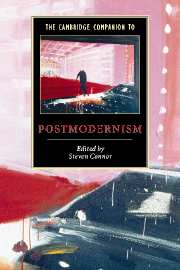Book contents
- Frontmatter
- Introduction
- 1 Postmodernism and philosophy
- 2 Postmodernism and film
- 3 Postmodernism and literature
- 4 Postmodernism and art
- 5 Postmodernism and performance
- 6 Postmodernism and space
- 7 Science, technology, and postmodernism
- 8 Postmodernism and post-religion
- 9 Postmodernism and ethics against the metaphysics of comprehension
- 10 Law and justice in postmodernity
- Further reading
- Index
- Sereis List
1 - Postmodernism and philosophy
Published online by Cambridge University Press: 28 May 2006
- Frontmatter
- Introduction
- 1 Postmodernism and philosophy
- 2 Postmodernism and film
- 3 Postmodernism and literature
- 4 Postmodernism and art
- 5 Postmodernism and performance
- 6 Postmodernism and space
- 7 Science, technology, and postmodernism
- 8 Postmodernism and post-religion
- 9 Postmodernism and ethics against the metaphysics of comprehension
- 10 Law and justice in postmodernity
- Further reading
- Index
- Sereis List
Summary
This is the end
Postmodernist thinking has typically reacted with suspicion to the notion of origins. As first cause or foundation, an origin - a transcendental ground to which all subsequent phenomena must pay obeisance - resurrects the deity that the “death of God” supposedly vanquished. This resistance to origins is matched by a much messier obsession with “ends.” Postmodernist endings are not so neat as the term suggests, however. They are thorny and recalcitrant, at the very least placing certain practices or instruments of thought off-limits; at most, the latter are rendered fallacious, untenable, “no longer possible.”
An abiding example of this temper is the seemingly suicidal declamation of the end of philosophy. Where philosophy has engaged directly with postmodernism – let us call the result, for the moment, post-Nietzschean continental philosophy – it has produced a kind of thinking that cleaves to the shadow of its own mortality, compulsively rehearsing its own demise. But unlike other postmodernist annulments – the “ends” of authorial presence and ideology, for example – philosophy’s reprieve was granted in the same breath as its death sentence was pronounced. Which is to say, accompanying the termination was the possibility of renewal, ways of finding new uses for philosophical thinking. In fixating upon the conditions of its own abolition, then, philosophy turned those conditions into a kind of negative capability.
- Type
- Chapter
- Information
- The Cambridge Companion to Postmodernism , pp. 20 - 42Publisher: Cambridge University PressPrint publication year: 2004
- 5
- Cited by



